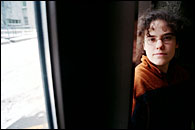Kaleidoscope
Anne-Marie Rollin: The delights and tribulations of running Le Délit
 |
|
Le Délit Français is turning 25 this year and Anne-Marie Rollin, the paper's editor-in-chief, would like everyone to know about it. Especially francophones at the University.
That's why, eight months shy of its official birthday in September, Rollin brought out the candles and called up the city's media to mark the paper's silver anniversary. She jump-started the celebrations, she says, when the paper's existence was ignored during the 90th anniversary of its sister publication, the McGill Daily.
Although Rollin feels the oversight wasn't deliberate, she decided to take steps to ensure that Le Délit's place on campus was equally lauded. So she devoted an entire January issue of Le Délit to re-examine its role at McGill. Then she sent out press releases and gave interviews, hammering the point that McGill's 6,000-plus francophones have their own paper, too.
Montreal media lapped up the story. Le Journal de Montréal even ran the cutting -- and inaccurate -- headline, "Thirty-three years after the 1969 riots, the situation of francophones has hardly progressed at McGill."
The paper was referring to the McGill Français uprising; a event in which some francophone Quebecers protested in the streets and demanded that the University be turned into a French institution.
It wasn't. Fast-forward three decades and McGill works hard to attract French-speaking students. McGill recently hired a first-year coordinator for francophone students, to ease their transition into an English milieu, and the University has a mandate to raise the number of francophones who study here up from 21 percent to 25 percent of its student body.
Rollin is an example of the many francophones who registered at McGill to broaden their horizons and learn a second language. "I wanted diversity," she says, after being schooled in her native tongue her entire life. "Going to a French university was out of the question."
Two years into her McGill experience, Rollin has come to the conclusion that the University should do more to cater to francophones. She muses that "McGill doesn't reflect the reality of Quebec society," since only a small selection of courses are offered in French.
She is also critical of the fact that some Students' Society and McGill documents are published entirely in English.
Rollin's studies focus on international studies and economics and she holds down a part-time job as a cook to pay her rent. But the day-to-day management of the student paper is her most time-consuming challenge. When she assumed her position as editor-in-chief last fall, she was given zero training. "I basically needed to teach myself everything," Rollin recalls.
That learning curve, coupled with the fact the bulk of her duties are administrative, has stopped her from writing as often as she would like. Losing byline opportunities has been tough on Rollin. "I love writing," she says.
The upside to editing, however, is that Rollin's editorial skills have been sharpened: "Correcting other people's work has allowed me to improve my own writing three times over."
Rollin clocks anywhere from 20 to 40 hours per week at Le Délit. She's even been rumoured to sleep at the paper's offices to meet deadlines. "My grades really suffered during my first year at the paper," she confides. "I was focusing too much on Le Délit and not enough on school."
Now her grades are up, as is the number of Le Délit staffers. Both are a relief to Rollin, who needed to recruit a battalion of story contributors last fall. She also needed to fill four of seven editorial positions at the paper.
The staff depletion occurred when the Délit guard changed, following the graduation of many editors and writers, a recurrent problem about every three years. "Finding staff was an enormous challenge," Rollin says. "But we found them and now our team is really strong."
This respite has allowed Rollin to consider her future, which may or may not include a journalism career. "While many Délit reporters have gone on to major media, I'm still not sure what I want to do," she says, noting that Délit alumni include two prominent Sophies in the Quebec media: Cousineau of La Presse and Durocher of Télé-Québec.
"I want to get involved in a career where I can make a difference," she says. "That's why I'm enrolled in international development."
For now, though, the only thing she's definitely planning is to complete her BA. She may proceed to graduate studies in journalism afterwards, but she's in no rush to determine her future just yet: "The one thing I've learned in my life is that you get nothing from rushing ahead."
 |
||||
|
I think the year they spend at the bar school is a waste of time. I know many of our really bright students are leaving Quebec because they don't want to spend a year there. |
||||
On call as the world watches
As Canada's top athletes prepare to take on the world's best in the Salt Lake City Winter Olympics, they will be under the watchful eye of medicine professor Robert Foxford.
 Dr. Robert Foxford
Dr. Robert Foxford |
|
Foxford is the chief medical officer for the Canadian Olympic team and he and his staff are already busy treating athletes even though the opening ceremony isn't until tomorrow night.
"These are some of the world's best athletes and they are always pushing their bodies beyond their capabilities. Studies indicate that about half of the athletes who come to the Olympics are already hurt when they turn up."
Foxford was also part of the medical team for Canada during the Sydney Summer Olympics in 2000. "You come across some pretty interesting injuries -- dislocated jaws, foot fractures, torn hamstrings, dislocated bones in wrists..."
Still it's nothing compared to his day job as an emergency room physician at the Royal Victoria Hospital. "This isn't a walk in the park, but I deal with disaster everyday in the ER."
Foxford says athletes appreciate having medical staff from their home countries on hand in case anything goes wrong. He was recently on duty at a World Cup ski event in Lake Placid when one of the Canadians, a francophone, took a fall. "I was able to speak to her in French and she told me it was good to hear my voice. It's reassuring for the athletes to know that there are people there who care about what happens to them."
Foxford oversees a team of 27 medical specialists, including Dr. Suzanne Leclerc, a lecturer in McGill's Department of Family Medicine and a member of the McGill Concussion Research Group.
While the medical team has had to bone up on anthrax and ensure that there is a large stock of Cipro on hand, Foxford says the terrorist threats from September 11 haven't affected Canada's athletes much. "They're very up, very positive. I think this could be a really strong Olympics for us."
And although he is a seasoned and respected physician, Foxford says he still gets excited in the presence of famous athletes.
"I just met Kelly Law, the skip of the woman's curling team, and that was a big thrill because I'm a curling fan. I met [skater] Elvis Stojko yesterday. I've played hockey all my life and I imagine I'll get goosebumps when I meet Mario Lemieux and Steve Yzerman.
"You never lose that thrill from meeting these sorts of people and being at an event like this. And if you did, maybe you shouldn't be here."
 |
||||
|
We're not going to shut them down today, but we could if we wanted to! |
||||

